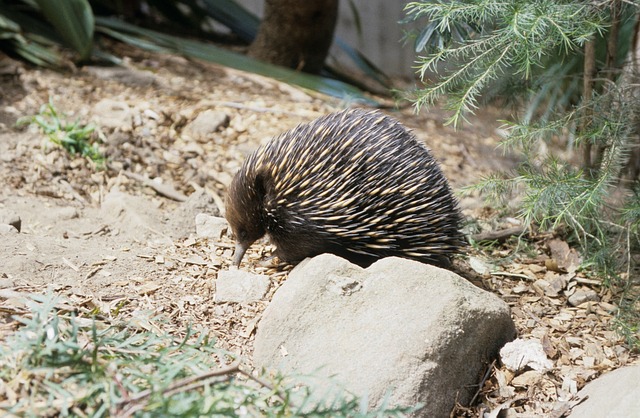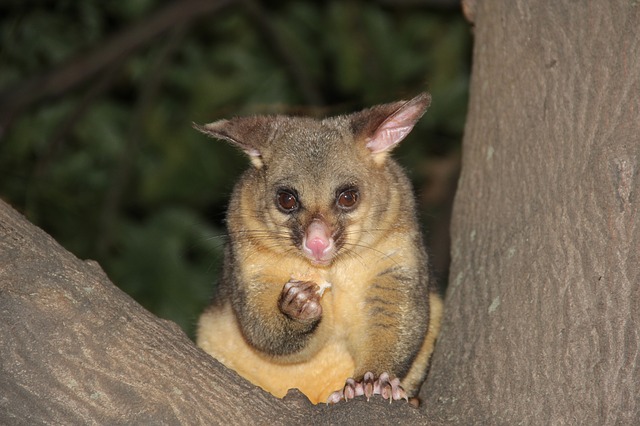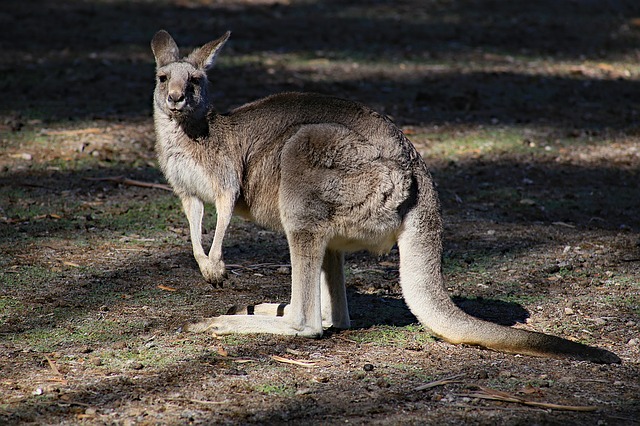Koala
A recent AdelaideNow.com news article detailed how a Koala on a very hot day, climbed the garden and pool fence, had its fill of water being so hot, and then took its rest under the jetty on the cool rocks all afternoon, moreover with the householders doing their own things.
Although this may seem a little odd to some, in my experience, it is rather more the norm than the exception.
These are some examples from our family's animal friendly history and I'm quite sure you too might recount your own 'natural-indigenous' animal and bird encounters. We're not talking here about cattle and horses and dogs and cats, sheep and goats and the like. There are well established histories of "talking to the animals" – my late father, a dairyman knew how to talk to his cows and horses and dogs and whatever else. Rather, we're discussing Australia's indigenous animals and birds.
For 14 years we lived in Moruya on the NSW south coast on a 10 acre allotment, where my wife Delma and I served the Australian Institute of Sport elite athletes on their respite at Basil Sellers House.
In those years we enjoyed many animal and bird visitors who became, something akin to neighbours, we got use to them and their carry-on engagements with each other. They too adjusted to us and the kids shouting and laughing and making all kinds of astonishing and strange noises that might have frightened off a lamentation of swans.
This allotment was hilly and a forest of Ironbarks in which we established a walking track through the bush and called it Australia's Bush Orchestra as the Bell Minor (Bellbirds) encapsulated the entire acreage. On one occasion a Swedish gentleman visited and the following year he returned with sound recording equipment to illustrate to his family and friends that he wasn't telling porkies.
On one occasion British track and field athletes came to the athlete respite facility and told us they had never seen a snake in the wild. Roger Black the British 400 metre runner led the way, turning over fallen logs and the like in the search for a snake in the wild. I was rather pleased that on this occasion the snakes in the wild made a speedy getaway - as our little snake hunting party troupe made plenty of noise.
In such a setting with thick bush land, the undergrowth almost impenetrable in parts, it was hardly unlikely that we wouldn't get animal and bird visitors - after a while they developed a sense of trust with us and we with them.

Echidna
Parrots
First, I constructed a length of timber on the upstairs veranda and on the end a large tin plate was placed whereupon I put bird seed. Parrots of all kinds and varieties soon began visiting and after a few weeks were content enough for us to come out of the double glass doors onto the veranda. It wasn't long before they happily sat on our hands and ate bird seed from our open palms.
Marsupials
There was always some bird seed left in the evening and this was when the numerous families of possums visited us. They'd climb to the second storey veranda and enjoy these morsels, and bring their babies on their backs. We would look at them through the glass door, and they at us. After a few weeks, having acknowledged each other, evening and night followed by evening and night, we began to edge ourselves out to the veranda. As time went by, and as long as we left seed for them, we were able to get close enough to call each other by our first names (as it were).
Wallabies and Kangaroos also visited us but they took a much longer time to feel comfortable with us. The Kangaroos and Wallabies at the caravan parks from Batemans Bay to Narooma were more familiar and lazed around the grounds as guests came hither and thither.

Possum
Others
A Frog Mouth Owl came regularly once or twice a week to the veranda railing to say hello. It would gaze at us through the glass doors to check what we were up to, say its hellos and greetings and then disappear into the night.
Likewise a number of Kookaburras who happily took food from our open palms and other feathered friends, all of whom had made this 10 acres Ironbark allotment their home. Once daylight came the Bell Minors started-up. Although they had very high Ironbarks in which to build their nests, many of them, constructed their nesting at eye level as if to greet us as we strolled on bye.
I lost count of the number of Echidna that came by. It was as if there was a trial that came right past my downstairs office. They would make their way to the house, onto the concrete downstairs patio, wait and say hello, and then continue on - to wherever they were heading.
These illustrations can be recounted time and again by many Australian households. It appears to me that they sensed whether there was any threat, otherwise they seem to adjust to us humans in our and their daily routines. Francis and John Wesley assured us there was an animal heaven.

Kangaroo
Dr Mark Tronson is a Baptist minister (retired) who served as the Australian cricket team chaplain for 17 years (2000 ret) and established Life After Cricket in 2001. He was recognised by the Olympic Ministry Medal in 2009 presented by Carl Lewis Olympian of the Century. He mentors young writers and has written 24 books, and enjoys writing. He is married to Delma, with four adult children and grand-children. Dr Tronson writes a daily article for Christian Today Australia (since 2008) and in November 2016 established Christian Today New Zealand.
Mark Tronson's archive of articles can be viewed at
http://www.pressserviceinternational.org/mark-tronson.html

Dr Mark Tronson - a 4 min video
Chairman – Well-Being Australia
Baptist Minister 45 years
- 1984 - Australian cricket team chaplain 17 years (Ret)
- 2001 - Life After Cricket (18 years Ret)
- 2009 - Olympic Ministry Medal – presented by Carl Lewis
- 2019 - The Gutenberg - (ARPA Christian Media premier award)
Gutenberg video - 2min 14sec
Married to Delma for 45 years with 4 children and 6 grand children